Insights
From Battlefield to Business—How a Veteran Found Success
By
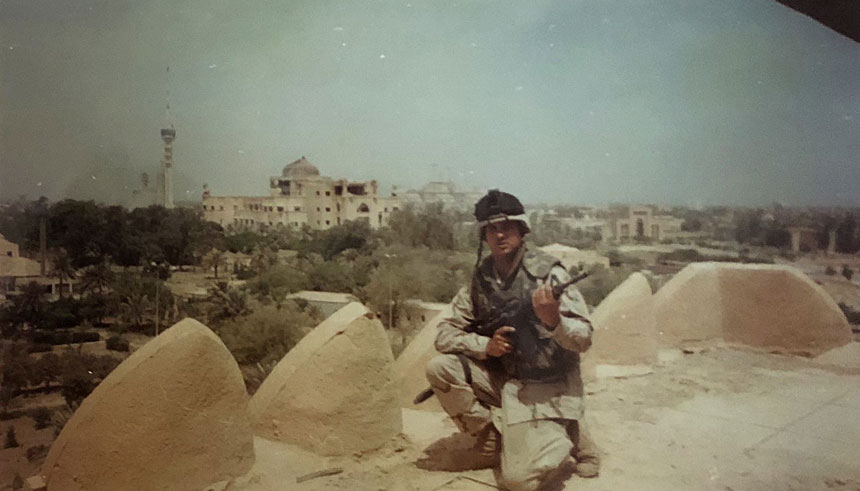
An Iraq veteran leverages a niche expertise to launch a business that honors his fellow soldiers.
It started off as a way to keep his brain occupied. A former sergeant in the United States Army who served two tours of duty in Iraq in 2003 and 2005, Joshua Gonzalez, needed something else to think about or do so he could cope with the aftermath of warfare.
When Joshua was first deployed to Iraq, improvised explosive devices (IEDs) were not as widely known as they are today. As the name suggests, IEDs are “homemade” bombs designed to destroy and/or incapacitate vehicles and personnel, often with what the U.S. Department of Homeland Security calls “enhancements” like nails and glass that can increase the amount of shrapnel in an explosion.
“It was a new thing coming out of Iraq,” says Joshua. “I did lose several of my friends out there.”
Although the surviving soldiers were given some time to grieve after these losses, Joshua says they all just had to push through it and continue on with their duties. “You really have to fight through it,” he explains. “You still have a mission to accomplish out there. You still have to perform. It was nice when they would give us a little break to cope with it, but then you have to go back in it.” Combined with the stress of constantly wondering who the enemy is, worrying about where the next attack is coming from, it’s no wonder that his mind still flashes back to those times, even over a decade later.
“Every time I get hit with it and it comes back to my mind, I do a quick reaction and say, ‘Thank God I’m here,’ because there are a lot of soldiers that did not make it.”
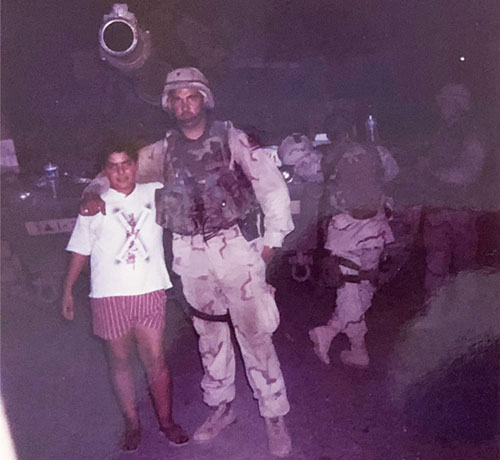
Sometimes it happens when he’s driving. When he isn’t thinking about work or family, his mind will flash back to that time—the confusion, the sheer dumb luck of survival. “If my mind is not thinking of something, it will bring those memories back,” Joshua shares. “Every time I get hit with it and it comes back to my mind, I do a quick reaction and say, ‘Thank God I’m here,’ because there are a lot of soldiers that did not make it.”
He started American Veteran Contracting Solutions (AVCS) as both a way to keep his mind busy and to pay tribute to the soldiers who gave their lives for their country. Although making headstones for veterans might sound macabre, Joshua sees it as a way of honoring his comrades for their sacrifice.
“I take it really personal,” Joshua says. “Being a veteran of war, you understand patriotism. Being able to get out of the military, and years down the road, to start this business—it means a lot. That (the burial) is the soldiers’ last rites. Being able to play a part in it means the whole world. After you’ve fought in a war, serving this country, my company is able to play a part in your final resting place.”
Launching American Veteran Contracting Solutions
Joshua’s uncle Marco Gonzalez first approached him with the idea to start AVCS after he attended a conference and noticed the veterans’ booth. At the time, Joshua had just been turned down from a job at border patrol, due to his hearing issues, and was looking into other options for work.
“Marco came up to me and said, ‘Hey, you ought to look into this. There’s a lot of opportunity for service-disabled veterans’ businesses,’” says Joshua. Although his uncle had been in the stone business for 30 years primarily working with large retailers (Marco co-founded GBI Tile & Stone), Joshua says they had no idea how many opportunities there were in the industry coming from the government.
“We started seeing all these projects in granite and marble, so we said, ‘Hey, we have experience in them, let’s go after it,’” Joshua shares.
The line-of-credit as the foundation success
Once they got the ball rolling, AVCS took off—fast. In May 2017, Joshua and Marco began putting business plans together, and in September that same year, they launched operations with the help of Jeff Jonas, Marco’s business partner at GBI.
“We literally went from running down the runway to taking off,” Marco says with a laugh. “I’m being generic, but it was great working with Ming, Thomas, and the team (at East West Bank). We were able to set up a credit facility to help finance this growth. The bank has been able to help get this one off the ground.”
The first critical step, as Marco describes it, was getting the right financial support. Ming Dai, first vice president and manager of commercial banking at East West Bank, helped AVCS get a line-of-credit from the bank to support their rapid scaling—which they needed, since within a year they picked up two national government contracts. Dai, Marco and Jeff have worked together for over 10 years, and Dai was the first person they went to when AVCS needed financial services.
"Being a veteran of war, you understand patriotism. Being able to get out of the military, and years down the road, to start this business—it means a lot.”
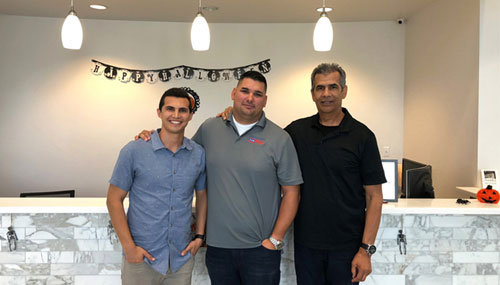
Not only did Joshua and Marco present a sound business model, Dai also saw an alignment in principles with AVCS. “East West Bank is a bank that has an entrepreneur spirit,” explains Dai. “This is our legacy. This is our core business—small and medium-sized businesses.”
Marco adds that the AVCS team looks at East West Bank as not only strategic partners, but also as friends. “One thing they always brought to us was going above and beyond with our businesses,” Marco shares. Dai and his team even traveled with Marco and his GBI business partner to China to help them with negotiations. “They’ve been right beside us—and I mean that sincerely,” says Marco.
“Like Marco said, everything started with East West Bank,” adds Joshua. “If we would have never had that foundation, we probably wouldn’t be where we’re at now.”
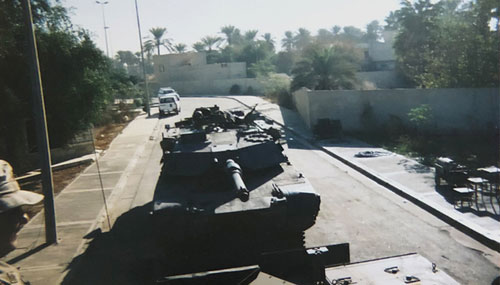
Global operations & challenges
Although the contracts are national, their business operations can take them all over the world. Along with the logistical difficulties of getting a 230-pound headstone to its desired location, the AVCS team often has to ship them to far-flung or remote places, which could mean personal residences in the middle of Alaska, or countries as far away as Ukraine.
“The challenge has basically been moving all these headstones all the time,” explains Mitchell Gonzalez, manager of operations at AVCS and Joshua’s cousin. “You can’t just send it in a UPS truck. For us, it’s always trying to plan one step ahead.”
It’s taken some creative maneuvering and straight luck to get some headstones to their destinations. When they had to ship the headstone to a house in Alaska, Mitchell shares that none of the freight companies were willing to take it there. “Finally, we got ahold of somebody at the airport who we convinced to do it as a favor to us,” Mitchell says. “He said, ‘Hey, I’m a veteran as well. This is a veteran headstone. Just get it to me at the airport, I’ll put it in the back of my truck, and drive it out.’ A couple times like that, we’ve had a few veterans look out for other veterans and help us out in getting (the headstones) to them.”
Other times, the obstacles come in the form of Mother Nature. Recently, Marco shares that a soldier had been killed in action in Afghanistan, and they needed to ship out a headstone immediately. However, at the time, Hurricane Florence was coming in, which caused delays and grounded flights.
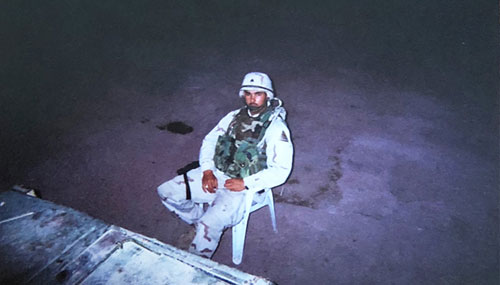
“Knowing that…the soldier died in a different country, being able to put that last marker in this last home—it means a lot.”
“We were doing the engraving, which is the final step of the headstone, down in Crestview, Florida—that’s the panhandle,” explains Marco. “The hurricane hit just above Florida.” The AVCS team was looking at every option to ship the headstone to its destination in Virginia on time, but none arose. Finally, they decided to fly around the hurricane, land north of Virginia, and drive it the rest of the way, delivering 24 hours ahead of schedule. “We will do whatever it takes to deliver the headstone on time to the family,” Marco adds.
“Knowing that…the soldier died in a different country, being able to put that last marker in this last home—it means a lot,” Joshua emphasizes. “It was like bringing him home from a different country that he died in, fighting for this country. Being able to put the headstone on there—that this is his last place where he’s going to be laid to rest—it’s amazing to me.”
Giving back to veterans
With their foundation for success settled and operations in stable condition, Joshua believes that now is the time when they can start thinking of expanding the business and giving back to the community.
Mitchell says that one step could be to support veterans’ transitions back to life in the U.S. “When people come back from overseas, they have a hard time finding jobs and transitioning back from being in a totally different mindset and lifestyle,” he says. “There are a few organizations around here that kind of help with that transition in Orange County that we’ll be donating to and trying to help out as much as we can.”
Along with supporting veterans that way, Marco, Joshua, and Mitchell are also looking at partnering with charities that would find AVCS’s expertise useful.
“Since we’re in the stone business, sometimes there are charities that build houses for them,” says Joshua. Particularly for veterans who may have been injured and/or disabled while serving, Joshua thinks that helping to provide them with a beautiful house would be an ideal way to give back and welcome them home. “Maybe we can supply all the hard surfaces, the granite and marble. We can fabricate it for them however they want it, however many pieces they need. I think it’ll mean a lot.”

